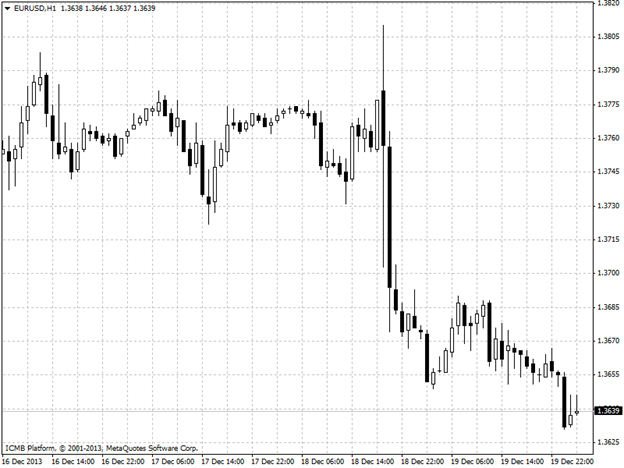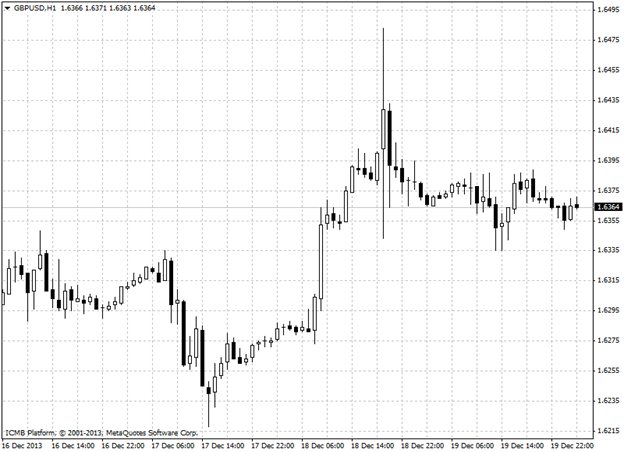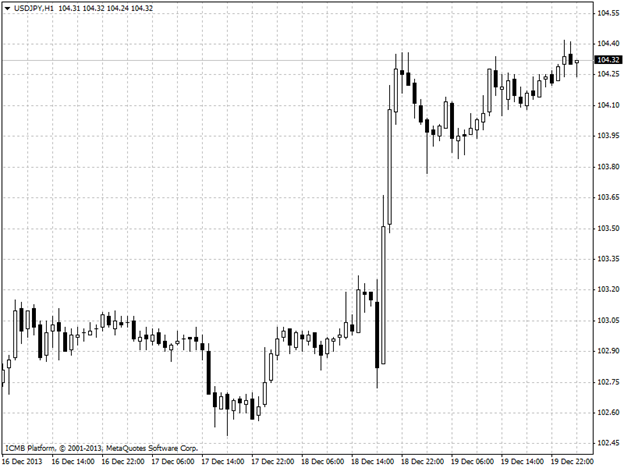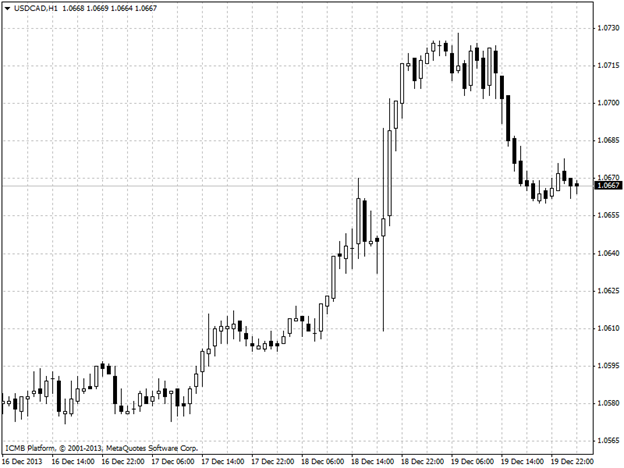EUR/USD
The euro edged lower against the dollar on Thursday as markets digested the Federal Reserve's decision to cut its USD85 billion in monthly bond purchases by USD10 billion beginning January, which could open the door to a longer-term strengthening trend for the greenback. Fed bond purchases tend to weaken the dollar by driving down long-term interest rates that send investors to assets like stocks to encourage investing and hiring. The U.S. central bank reiterated that interest rates are likely to remain low even after the unemployment rate drops below 6.5%, the threshold at which the Fed has previously said it would start to consider rate increases. Meanwhile, less-than-stellar economic indicators in the U.S. watered down the greenback's gains. The Federal Reserve Bank of Philadelphia said that its manufacturing index jumped to 7.0 for December from November’s 6.5 reading, though analysts were expecting the index to rise to 10.0 this month. EUR/USD" border="0" height="468" width="624">
EUR/USD" border="0" height="468" width="624">
GBP/USD
The pound slumped against the dollar on Thursday as investors snapped up greenback positions in wake of the Federal Reserve's Wednesday decision to trim its USD85 billion in monthly bond purchases by USD10 billion in January. On Wednesday, the Fed announced that it would reduce its USD85 billion-a-month bond-buying program by USD10 billion in January now that the economy is improving, which boosted the greenback against most major currencies. Fed bond purchases tend to weaken the dollar by driving down long-term interest rates that send investors to assets like stocks to encourage investing and hiring. Meanwhile in the U.K., the Office for National Statistics reported earlier that retail sales increased by 0.3% last month, matching forecasts. Retail sales were 2% higher on a year-over-year basis, the ONS said, undershooting expectations for a 2.3% gain, after rising at an annual rate of 1.8% in October. Demand for the pound remained supported after data on Wednesday showed that the U.K. unemployment rate unexpectedly fell to a four-and-a-half year low of 7.4% in the three months to October, fuelling hopes that the Bank of England will raise interest rates ahead of other central banks.  GBP/USD" border="0" height="452" width="624">
GBP/USD" border="0" height="452" width="624">
USD/JPY
The yen was slightly weaker against the dollar on Friday ahead of the Bank of Japan's latest review of monetary policy expected to stand pat on its monetary base policy target and keep the pace of asset purchases steady. Overnight, the dollar advanced against most major currencies after the Federal Reserve said it was trimming its USD85 billion monthly bond-buying program by USD10 billion next month, though lackluster economic indicators watered down the greenback's gains. Fed bond purchases tend to weaken the dollar by driving down long-term interest rates that send investors to assets like stocks to encourage investing and hiring. The U.S. central bank reiterated that interest rates are likely to remain low even after the unemployment rate drops below 6.5%, the threshold at which the Fed has previously said it would start to consider rate increases. Meanwhile, less-than-stellar economic indicators in the U.S. watered down the greenback's gains. USD/JPY" border="0" height="468" width="624">
USD/JPY" border="0" height="468" width="624">
USD/CAD
The U.S. dollar pulled back from three-and-a-half year highs against the Canadian dollar on Thursday after data showed that U.S. jobless claims rose to the highest level since March. The U.S. dollar trimmed gains after official data on Thursday showed that initial jobless claims rose to a nine month high last week, sparking concerns over the recovery in the labor market. The number of people claiming unemployment assistance in the week ending December 14 increased by 10,000 to a seasonally adjusted 379,000 the Labor Department said. Analysts had expected U.S. jobless claims to fall by 35,000 to 334,000 last week from the previous week’s revised total of 369,000. The data came one day after the Federal Reserve announced that it would reduce its USD85 billion-a-month bond buying program by USD10 billion in January. In his last press conference as Fed Chairman Ben Bernanke said the economy was continuing to make progress. The U.S. central bank reiterated that interest rates are likely to remain low even after the unemployment rate drops below 6.5%, the threshold at which the Fed has previously said it would start to consider rate increases. USD/CAD" border="0" height="468" width="624">
USD/CAD" border="0" height="468" width="624">
- English (UK)
- English (India)
- English (Canada)
- English (Australia)
- English (South Africa)
- English (Philippines)
- English (Nigeria)
- Deutsch
- Español (España)
- Español (México)
- Français
- Italiano
- Nederlands
- Português (Portugal)
- Polski
- Português (Brasil)
- Русский
- Türkçe
- العربية
- Ελληνικά
- Svenska
- Suomi
- עברית
- 日本語
- 한국어
- 简体中文
- 繁體中文
- Bahasa Indonesia
- Bahasa Melayu
- ไทย
- Tiếng Việt
- हिंदी
Friday’s Major FX Outlook
Published 12/20/2013, 04:35 AM
Updated 04/25/2018, 04:40 AM
Friday’s Major FX Outlook
Latest comments
Loading next article…
Install Our App
Risk Disclosure: Trading in financial instruments and/or cryptocurrencies involves high risks including the risk of losing some, or all, of your investment amount, and may not be suitable for all investors. Prices of cryptocurrencies are extremely volatile and may be affected by external factors such as financial, regulatory or political events. Trading on margin increases the financial risks.
Before deciding to trade in financial instrument or cryptocurrencies you should be fully informed of the risks and costs associated with trading the financial markets, carefully consider your investment objectives, level of experience, and risk appetite, and seek professional advice where needed.
Fusion Media would like to remind you that the data contained in this website is not necessarily real-time nor accurate. The data and prices on the website are not necessarily provided by any market or exchange, but may be provided by market makers, and so prices may not be accurate and may differ from the actual price at any given market, meaning prices are indicative and not appropriate for trading purposes. Fusion Media and any provider of the data contained in this website will not accept liability for any loss or damage as a result of your trading, or your reliance on the information contained within this website.
It is prohibited to use, store, reproduce, display, modify, transmit or distribute the data contained in this website without the explicit prior written permission of Fusion Media and/or the data provider. All intellectual property rights are reserved by the providers and/or the exchange providing the data contained in this website.
Fusion Media may be compensated by the advertisers that appear on the website, based on your interaction with the advertisements or advertisers.
Before deciding to trade in financial instrument or cryptocurrencies you should be fully informed of the risks and costs associated with trading the financial markets, carefully consider your investment objectives, level of experience, and risk appetite, and seek professional advice where needed.
Fusion Media would like to remind you that the data contained in this website is not necessarily real-time nor accurate. The data and prices on the website are not necessarily provided by any market or exchange, but may be provided by market makers, and so prices may not be accurate and may differ from the actual price at any given market, meaning prices are indicative and not appropriate for trading purposes. Fusion Media and any provider of the data contained in this website will not accept liability for any loss or damage as a result of your trading, or your reliance on the information contained within this website.
It is prohibited to use, store, reproduce, display, modify, transmit or distribute the data contained in this website without the explicit prior written permission of Fusion Media and/or the data provider. All intellectual property rights are reserved by the providers and/or the exchange providing the data contained in this website.
Fusion Media may be compensated by the advertisers that appear on the website, based on your interaction with the advertisements or advertisers.
© 2007-2025 - Fusion Media Limited. All Rights Reserved.
